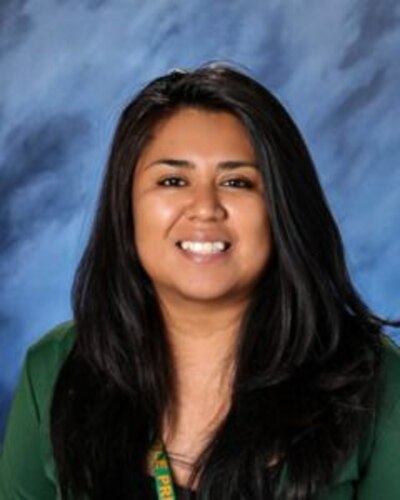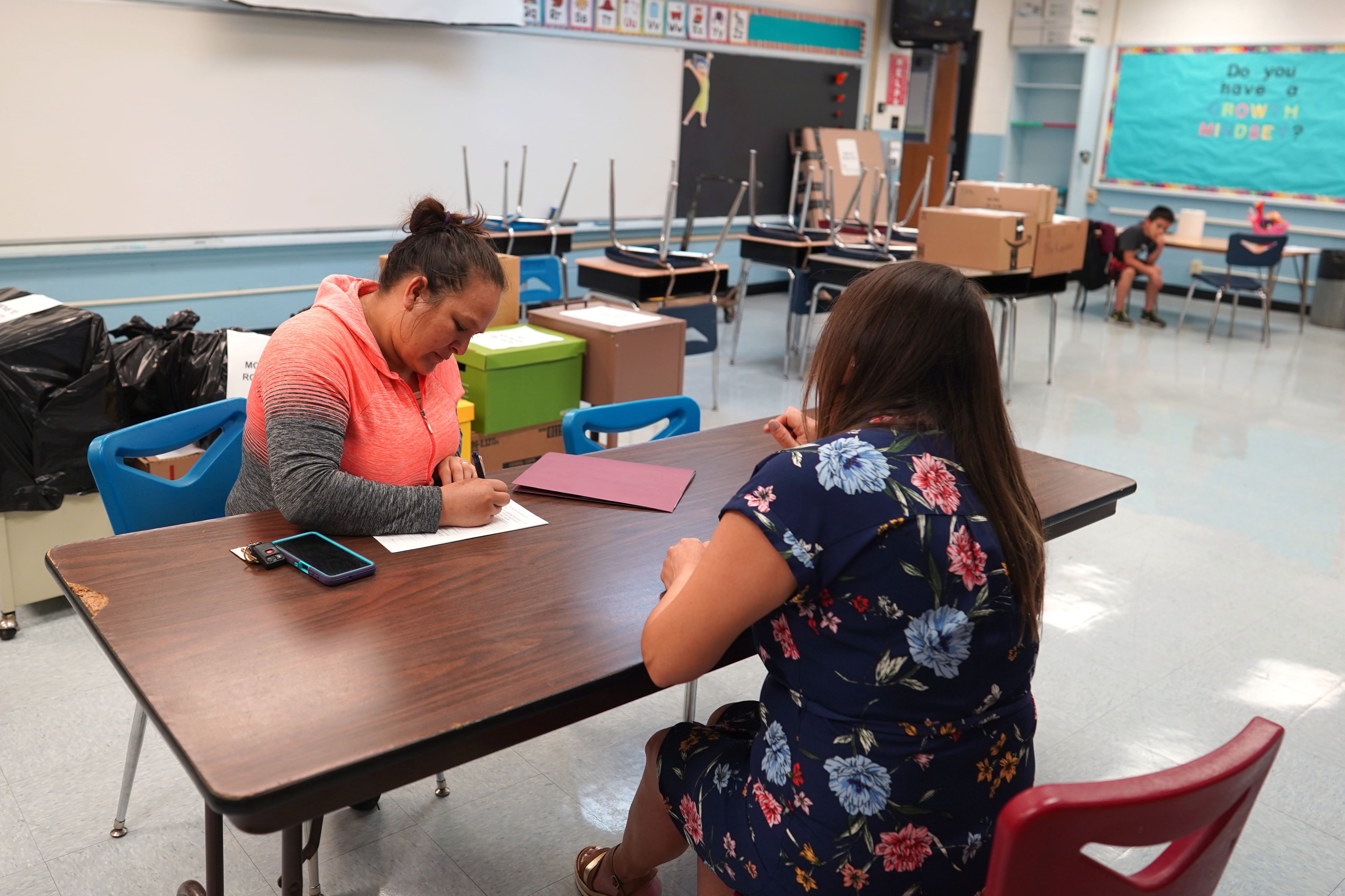As more schools see a need to focus on student mental health, districts are hiring new mental health professionals to help.
But what do these various positions involve, how do they work together, and how can they help students?
Chalkbeat talked to a bilingual school counselor in Adams 14 to learn more about how school counselors work with students and how being bilingual contributes to the job.
Brenda Moreno Negrete is the only bilingual counselor in the only comprehensive high school in Adams 14, a district north of Denver, where about half of the more than 6,000 students are identified as English language learners and most come from Spanish-speaking homes. Here she talks about her job and how being bilingual helps her talk to more students and connect with families.
The following interview has been edited for clarity and length.
Do you have more questions about mental health positions at your schools you’d like to share with us? Send us an email at co.tips@chalkbeat.org.
Tell us about your job.

It is my first year as a school counselor here at Adams City High School. School counselors, we have three main domains that we focus on: academics, career, and then social-emotional, which is where the mental health part comes in. They go hand-in-hand. A lot of times we have kiddos struggling at home or with mental health that affects their academics. Being able to look at kiddos in that holistic way is where we try to help.
A lot of college programs including mine we do internships and practicums where we do just mental health — that’s all we do we do, and then later we incorporate the academics part of it.
I grew up in the community I’m serving. We do have an intern that is bilingual, but I am currently the only bilingual licensed counselor at the school which has been of huge help. It’s just really nice to be able to connect with families in their language. I know my community and I know how important it is for parents to connect with people who speak their language and who can connect with them. I also know the needs here so I wanted to come here and I wanted to start my career here.
What kind of work do you do with students on a typical day?
It varies. If a kid is talking about suicide or self-harming, we get called in and we do screeners. If a kiddo is having a tough day they come to us and meet with us, whether it be about anything from anxiety, which we have seen a lot, to depression, to maybe even just relationship problems. We go ahead and talk to them. We do talk about academics but that is not all the focus.
If we see they’re having attendance issues then we go ahead and check in and see what’s going on. A lot of the time it has something to do with their life at home or they are struggling with mental health.
How are students assigned to one of the four counselors?
It depends on the school. Right now at our school we have them by alphabetical order, so it’s by last name.
When it comes to kiddos, their families might only speak Spanish, but a lot of kiddos are bilingual. We do have kiddos who maybe they just got here from Mexico or they’re fairly new. If they don’t speak English, then yes, that would be me. I go ahead and meet with them and talk to them just because right now our other counselors do not speak Spanish. We do have the intern who does and she does talk to some also.
What are the other mental health resources you work with at your school?
We have a social worker. She works with a lot of kiddos, she usually has a case load just like us. A lot of her kiddos have special education services or are on IEPs (Individual Education Program).
In this school we have Kids First, which is a clinic and they’re stationed here at the school, right in the same area as our nurse. Kids First also offers a therapist. If there are kiddos who need more time, for example my caseload right now is about 350 students, so that’s a lot of students. We do have kiddos who need maybe more individualized meetings with a therapist more often, like once a week or every other week. Then we do refer out.
We have Kids First and we have Griffith Center here at the school. Griffith Center is also a mental health place where they do all sorts of things, but they have someone who is actually here at the school. It’s really neat because when we refer students they meet with a therapist who is here at the school. The family does not have to go out. We try to eliminate that barrier. They usually try to pull them or meet with them during the school time, where they’re able to.
When do you connect with families?
It comes in a lot of different ways. Sometimes the parents do come in asking for help. They get phone calls saying that their kid is missing class and so some of them do come in. Or for example if we have a teacher who refers them and says, “Hey, I know this kid who maybe has cuts” or “I know this kid is feeling down,” then we go ahead and pull them and depending on what’s going on that’s when we make the connection at home.
Or we call as we’re checking in on students. We let them know what’s going on, especially for example with mental health, if we notice we need to check on what’s going on at home. If it comes to academics, we might call to let them know this is how they are looking for graduation.
Can students expect confidentiality, or when do you have to reach out to parents?
There is confidentiality with us and the student. There are only three exceptions where we need to break that. That is if they are being harmed, so if they’re talking about suicide, if they’re in danger. If they’re talking about hurting someone else or they want to hurt someone else or themselves, or if there’s an immediate danger to the building. It’s really only those exceptions, unless they give us permission.
When we meet with students we have signs and we do tell them. We do keep confidentiality. I am here for you, but there are exceptions to that. I always tell them and they do give me permission a lot of times to talk to the families. If the families are on board it makes all the difference, but sometimes it’s not safe.
For example if a kiddo is hurting themselves or having suicidal ideations, then having that conversation with parents in a way where the chid can feel safe and where it’s not so much stigmatized is one way we can help.
What do you want people to know about how you’re able to help students in this job?
Where we come in is we really try to see what’s going on, try to take the time to see what’s going on. If a kiddo is getting into fights, talking to them about anger and their coping skills. We really do not go into discipline because of the relationships we’re building with the students. We have to be the people they can go to.
Students have to be feeling good mentally and emotionally before they can even be students. In working with other professionals here at the school, we are able to be more intentional about mental health and what’s going on.
Bringing in other support like home and family. There are strengths in our community. Looping them in in a way where it can benefit the student if it’s possible that also helps. For example normalizing some of the things when we talk about mental health. Letting them know, a lot of kiddos are struggling with this. People struggle with it and it doesn’t have to be something that’s wrong with the kiddo. Normalizing that in a way where parents also feel support. Telling them we have these resources. If it’s here at the school, for example, it’s free. Talking to parents in a way they can understand it’s not this shameful thing.
The biggest misconception about school counselors is that we just look at grades or do scheduling. There’s this huge other resource that’s not being tapped into which is the mental health, the social-emotional part. We’re a great bridge to resources when it comes to how a student is feeling.
We have to meet with them about their grades, but it’s also about just letting them know we’re here because if the kiddo does open up, we can go ahead and get on that.
Yesenia Robles is a reporter for Chalkbeat Colorado covering K-12 school districts and multilingual education. Contact Yesenia at yrobles@chalkbeat.org.







